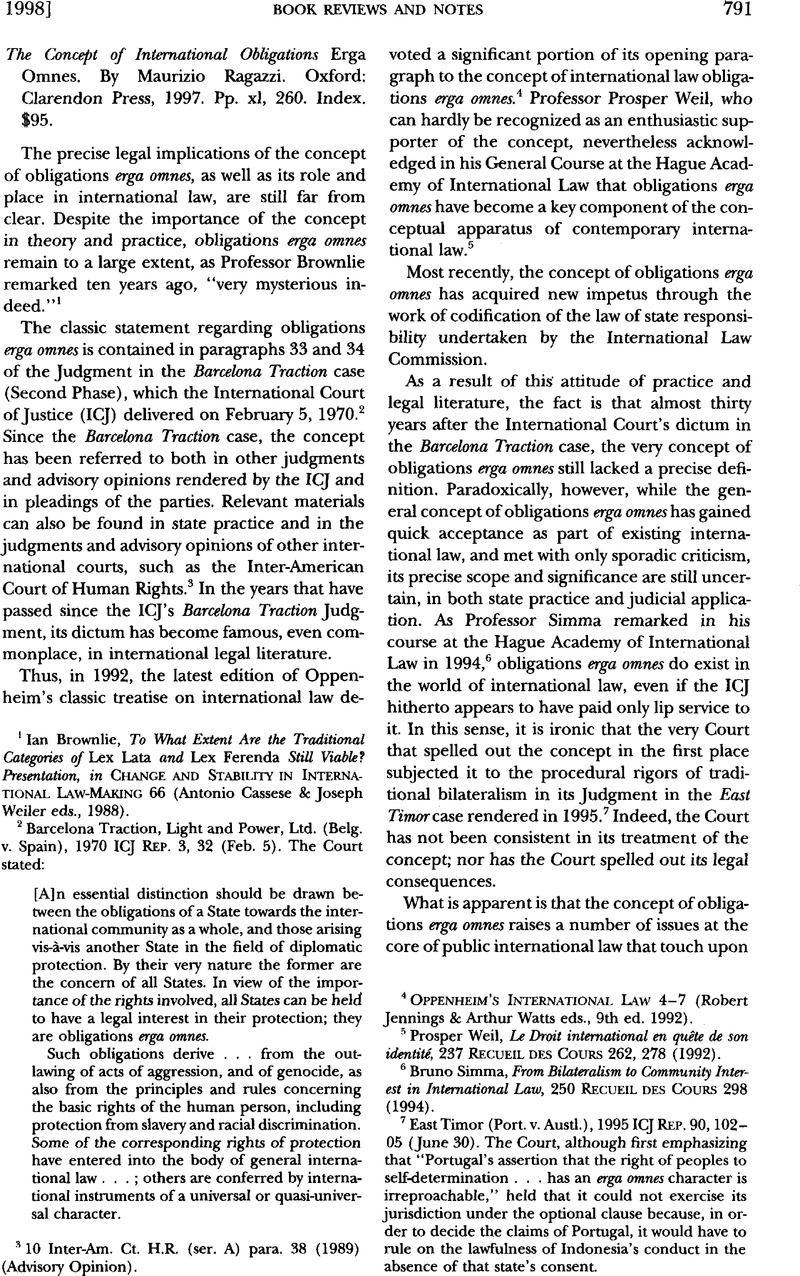Article contents
The Concept of International Obligations Erga Omnes. By Maurizio Ragazzi. Oxford: Clarendon Press, 1997. Pp. xl, 260. Index. $95.
Published online by Cambridge University Press: 27 February 2017
Abstract

- Type
- Book Reviews and Notes
- Information
- Copyright
- Copyright © American Society of International Law 1998
References
1 Ian Brownlie, To What Extent Are the Traditional Categories of Lex Lata and Lex Ferenda Still Viable? Presentation, in Change and Stability in International Law-Making 66 (Antonio Cassese & Joseph Weiler eds., 1988).
2 Barcelona Traction, Light and Power, Ltd. (Belg. v. Spain), 1970 ICJ Rep. 3, 32 (Feb. 5). The Court stated:
[A]n essential distinction should be drawn between the obligations of a State towards the international community as a whole, and those arising vis-à-vis another State in the field of diplomatic protection. By their very nature the former are the concern of all States. In view of the importance of the rights involved, all States can be held to have a legal interest in their protection; they are obligations erga omnes.
Such obligations derive … from the outlawing of acts of aggression, and of genocide, as also from the principles and rules concerning the basic rights of the human person, including protection from slavery and racial discrimination. Some of the corresponding rights of protection have entered into the body of general international law … ; others are conferred by international instruments of a universal or quasi-universal character.
3 10 Inter-Am. Ct. H.R. (ser. A) para. 38 (1989) (Advisory Opinion).
4 Oppenheim's International Law 4–7 (Robert Jennings & Arthur Watts eds., 9th ed. 1992).
5 Prosper Weil, Le Droit international en quête de son identité, 237 Recueil des Cours 262, 278 (1992).
6 Bruno Simma, From Bilateralism to Community Interest in International Law, 250 Recueil des Cours 298 (1994).
7 East Timor (Port. v. Austl.), 1995 ICJ Rep. 90, 102–05 (June 30). The Court, although first emphasizing that “Portugal's assertion that the right of peoples to self-determination … has an erga omnes character is irreproachable,” held that it could not exercise its jurisdiction under the optional clause because, in order to decide the claims of Portugal, it would have to rule on the lawfulness of Indonesia's conduct in the absence of that state's consent.
8 Legal Consequences for States of the Continued Presence of South Africa in Namibia (South West Africa) notwithstanding Security Council resolution 276 (1970), 1970 ICJ Rep. 359 (Advisory Opinion of Aug. 5); Nuclear Tests (Austl. v. Fr.; N.Z. v. Fr.), 1974 ICJ Rep. 253 & 457 (Dec. 20).
9 Restatement (Third) of the Foreign Relations Law of the United States §702 (1987).
10 The Protection of Human Rights and the Principle on Non-Intervention in Internal Affairs of States, 63 Institut de Droit International, Annuaire 338 (1989) (the English text of the resolution is a translation of the authentic French text).
11 Theodor Meron, Human Rights and Humanitarian Norms as Customary Law (1989).
- 1
- Cited by




